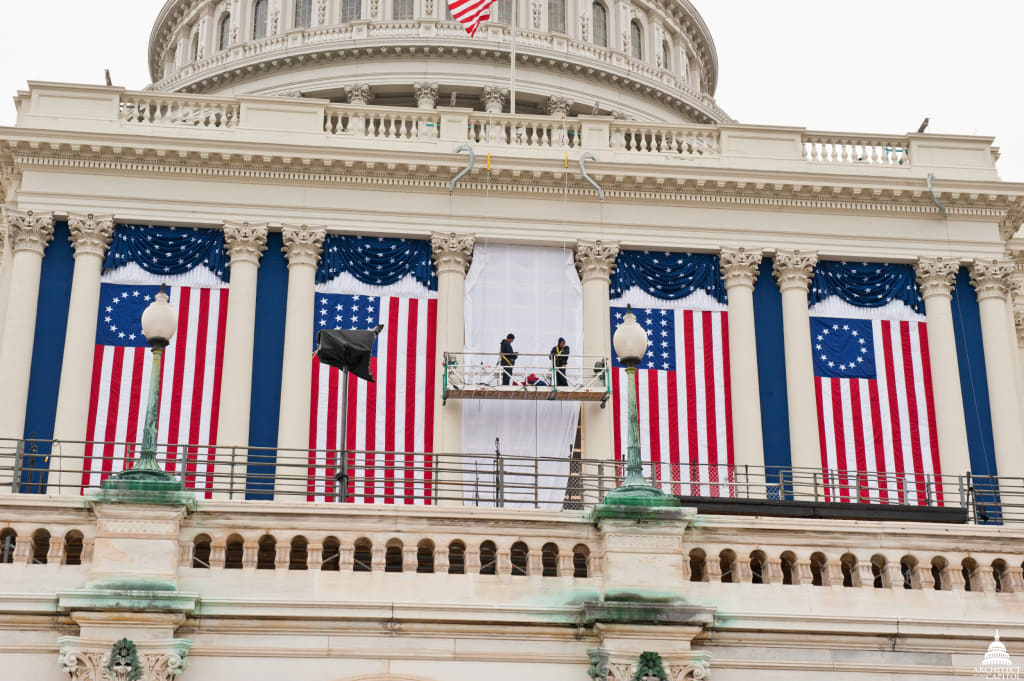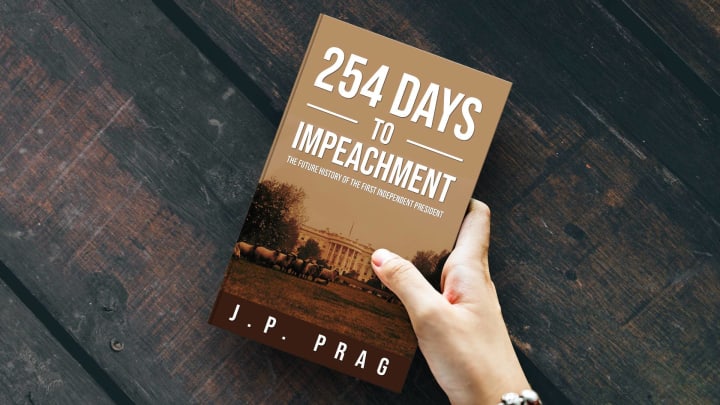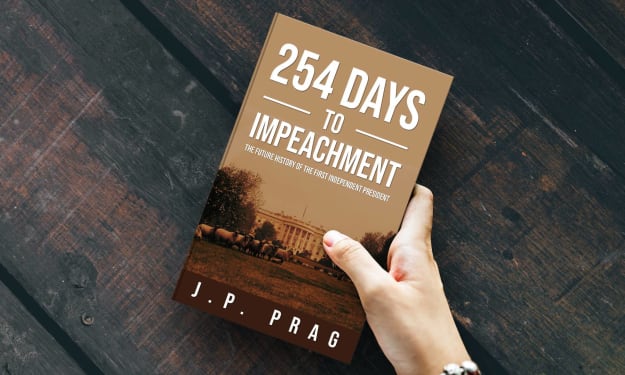
January 20th (Washington, D.C.) – While Inauguration Day is usually a festive affair, this one proved to be anything but traditional when the new President of the United States of America started the celebration by declaring that the “party is over”.
Of course, the newly installed President did arrive at the highest seat in the land through the most unconventional methods. Inspired by the books New & Improved: The United States of America and Always Divided, Never United, the Constitution was amended to eliminate the Electoral College and replace it with a mixed ranked and negative voting system. As a result of these alterations, for the first time since the election of 1848 that brought in Zachary Taylor of the Whig Party, someone not affiliated with either the Democratic or Republican Parties was elected. However, even the Whig Party was considered a major Political Party of its day. Thus, a true comparison would be to the last President who was not affiliated with any dominant Party: George Washington.
That is not to say that this President should be likened to George Washington—at least not yet. Still, based on what happened next, the comparisons are being made by those who support the President the most. Detractors, on the other hand, are already proclaiming vindication by declaring that the President’s actions demonstrate what happens when someone with limited political experience and service is given so much power. Whatever the case, the world has already changed irreparably in ways that cannot be easily undone. No part of the government or society will be able to reverse the course this President has now set the country on, no matter the consequences.
Even before assuming office, the new President caused a stir by choices made in the swearing in process. Despite traditions dating back to the aforementioned George Washington, the President refused to be sworn in while placing a hand on the Bible. Citing the First Amendment, the President made it clear that involving a Bible in a secular government procedure would be tantamount to endorsing a religion. While recent Presidents like Donald Trump, Barack Obama, and others dating back to Harry Truman swore on two Bibles—and Joe Biden used a family Bible dating back to the 1890s—there have been instances of Presidents opting to go other routes. According to his own account, sixth President John Quincy Adams said he swore on a book of law (though this has been disputed by several historians). Still, the newly affirmed President seemingly took a page from Quincy Adam’s book by asking to be sworn in by placing a hand on a copy of the Constitution itself.
To be clear, there is no requirement for the President to use a Bible or anything like it. Instead, the Constitution (Article 2 § Section 1 § Clause 8) simply states that the incoming President must:
... [T]ake the following Oath or Affirmation:—“I do solemnly swear (or affirm) that I will faithfully execute the Office of President of the United States, and will to the best of my Ability, preserve, protect and defend the Constitution of the United States.”
As can be seen, there is no requirement to use props or swear/affirm on anything at all. However, even here the new President had riled up controversy. Every President, save the 14th Franklin Pierce, used the word “swear” instead of “affirm”. Taking a cue from a forerunner that also did not use a Bible, this President refused to “swear” and would only “affirm”. When asked to explain this decision, the President noted:
Swearing is a level of commitment I cannot possibly attain. Swearing means that I will do it no matter what, which would not be true. I “affirm” to do my best and anything within my power, but not at unlimited cost. “Affirm” is more in line with my capabilities as President.
The President’s political opponents were quick to strike at these words, claiming they show how weak this President is and saying the President could not be counted on and would not uphold the Constitution. To these remarks, the President shrugged off the criticism and stated:
I believe my other actions around this ceremony show exactly how much I want to stick to the Constitution and Amendments, unlike my opponents and predecessors that regularly ignored them—right from the very beginning.
This response appeared to be in reference to the last part of the President’s swearing-in ceremony. While most Presidents in the past century have also added “so help me God” to the end of the affirmation—both with and without prompting—it is again not a requirement. Even when Theodore Roosevelt was inaugurated in 1901, he ended with “And thus I swear” and there was no noticeable concern in the newspaper articles from that era. Yet in this day and age, the act of removing a reference to God that is not required created yet more polemics. Religious groups took notice and claimed that the White House will force an atheistic lifestyle on them, and that the actions undertaken during the proceeding inauguration speech prove that the Commander-in-Chief is willing to push the boundaries of the office.
Whether the President would attempt such an action—or even desires to do so—remains up for debate. The leader of the free world did state that the administration has no interest in dictating how people exercise their religion or lack thereof. On the other hand, the President made clear that the administration is against mixing any religious symbols with government functions and would be spending time and resources to make sure that if any do currently exist that they will be promptly removed. Some have already taken that statement as an attack on religion in general.
Yet, all these actions in the first few minutes of becoming head-of-state were only the tip of the iceberg for what the President had in store for the American people. What came next has sent shockwaves around the world and has already irreparably challenged the security, stability, and standing of the United States both at home and abroad. Immediately after finishing the affirmation, the President stepped up to the microphone and told the assembled audience and the millions more watching around the country and the rest of the world:
My fellow Americans... the party is over. I am cancelling any and all other events associated with this inauguration as they are a waste of time and money. The resources we have—as a government of the people, by the people, and for the people—are limited; and I refuse to waste them on frivolities. It is time to get back to work.
The crowd that had been raucous just moments before was stunned silent. After intently gazing out at the masses and letting the mumbles die down a bit, the President continued:
Time is the most precious resource we have. And it is the most finite resource I have as President. I have just four short years to accomplish everything I have set out to do. Unless, of course Congress, in its infinite wisdom, decides to make it shorter.
A nervous laughter reverberated through the throng. While three Presidents have been impeached—with the most recent one being impeached twice—none have been convicted and removed from office by the Senate. Not being from either of the two major Political Parties, the independent President has no friends in Congress and could conceivably be removed should it come to that. And what the President did next may yet give rise to the first President ever being forcibly detached from their duly elected seat in the Oval Office.
Once the laughter quieted down, the President surprised everyone by presenting and signing ten Executive Orders, each one more astounding than the last. While the early ones garnered large cheers from much of the crowd, as they kept coming a palatable itch began to spread among those in attendance. Even those who may have desired all these intemperate actions most likely were flabbergasted at how rapidly it was all happening, with no time to breathe and process between each announcement.
Our team of expert political analysts will break down and evaluate each of these ten Executive Orders in a series of upcoming articles, so check back often for updates, reactions, and fallouts from today’s shocking revelations.
Meanwhile, social media has already erupted, both with proponents and detractors loudly declaring their benefits and dangers. That said, among all the noise, the world seemed to have coalesced around a specific nickname: The Ten Pronouncements.
At the conclusion of the speech, the President apologized to the dumbfounded crowd. That apology, though, was not for what had just transpired, but for what was to come next. Said the President:
My work for the day is not done and I need to take a trip across the country right now before others realize what is happening and can cover-up what they have done. That means I need to board Air Force One at the cost of millions and millions of dollars to the taxpayers. While I have campaigned on an agenda of cutting government waste and excess, in this situation I, unfortunately, must act in opposition to that promise. For this, I am deeply sorry. There is so little time, and so much work to do.
Having apparently finished, the President gathered up all the papers on the lectern and walked away. There was a scattering of applause throughout the crowd, but in reality there were mostly stunned faces both on and off stage, standing with their mouths agape as the President headed down the corridor and out of sight. With the President off on this secret mission, all we can do now is wait for what will undoubtedly be another astonishing day tomorrow.

The above piece is an excerpt from the speculative fiction novel 254 Days to Impeachment: The Future History of the First Independent President by J.P. Prag, available at booksellers worldwide.

Learn more about author J.P. Prag at www.jpprag.com.

254 Days to Impeachment is a work of mixed fiction and nonfiction elements. With the fiction elements, any names, characters, places, events, and incidents that bear any resemblance to reality is purely coincidental. For the nonfiction elements, no names have been changed, no characters invented, no events fabricated except for hypothetical situations.
About the Creator
J.P. Prag
J.P. Prag is the author of "Aestas ¤ The Yellow Balloon", "Compendium of Humanity's End", "254 Days to Impeachment", "Always Divided, Never United", "New & Improved: The United States of America", and more! Learn more at www.jpprag.com.






Comments
There are no comments for this story
Be the first to respond and start the conversation.